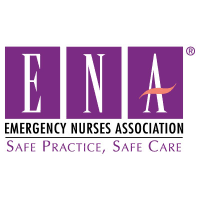Emergency Nurses Week kicks off today and offers a reflection of the lifesaving efforts and skill of emergency nurses who are called on to deal with catastrophic conditions, both natural and human-created, with little or no notice.
Karen Wiley MSN, RN, CEN, and president of the Emergency Nurses Association, says recent events highlight the unpredictability of the job and the exceptional need for emergency nurses.
“I am most proud of the way our nurses have come together in the past several weeks,” she says. “With the devastation from multiple hurricanes and the unconscionable event in Las Vegas, we have seen countless acts of sacrifice, selflessness, and dedication in emergency care from our nurses. I am proud of my colleagues every day, but the effort I have seen through these tragedies is truly remarkable.”
Wiley says emergency nursing is a complex role that involves treating the physical reasons for the visit, but also careful and expert communication with the team and the patient, families, and loved ones. “Most people do not realize the diversity of work emergency nurses must perform besides treating physical injuries,” she says. “Patients enter emergency departments struggling with addiction, mental health issues, as victims of sex trafficking, and, all too often, are violent themselves.”
If nurses are considering moving into emergency nursing or are wondering if the path would be right for them, Wiley says it helps to consider the range of what nurses encounter on a given day. “Thinking quickly on your feet is an essential skill for emergency nurses,” she says. “Situations change in a moment in the emergency department and nurses must react effectively.”
In the midst of an environment where many things are happening simultaneously, emergency nurses are still in charge of the patient’s comprehensive needs. “Emergency nurses must keep patient advocacy foremost at all times,” says Wiley. “The care, safety, support, and education of patients is our primary focus and dominant concern during a shift in an emergency department.”
Because they will take care of patients with many different conditions and situations, emergency nurses have to stay current on the latest medical information, so they have to be willing and able to constantly reeducate themselves about new developments, treatments, and methodologies. Emergency nurses continuously hone their craft, says Wiley, and that means being able to multitask effectively, efficiently, and accurately in a high-stress situation.
Emergency nursing is physically taxing, but it can also be an emotional challenge as well. Because of the very nature of an emergency room, patients don’t always survive despite the heroic efforts to save them. “Emergency nurses need to be prepared for the death of patients while not letting emotions affect their care,” says Wiley. Many hospitals have supports for their emergency room teams, especially after a trauma event, but the day-to-day exposure to death is something emergency nurses must cope with for their own job performance and their own mental health.
In addition to the challenges of treating so many physical and mental health issues, emergency nurses have to be able to quickly decipher and assess patients’ needs and conditions. “Choosing which patients need the most immediate care is challenging because the number of factors that need to be taken into consideration,” says Wiley.
For some nurses, the emergency room is where they perform best. And the ability to make such deep connections during that time is powerful. “Caring for patients who are in the most vulnerable state of their lives is an absolute privilege and an honor,” says Wiley. “The ability to comfort the patients and their loved ones when they need it most is humbling.”
- WOC Nurses Week Highlights Specialty - April 16, 2024
- Honoring Radiology Nurses Day on April 12 - April 12, 2024
- Travel Offers New Career Possibilities - April 8, 2024



